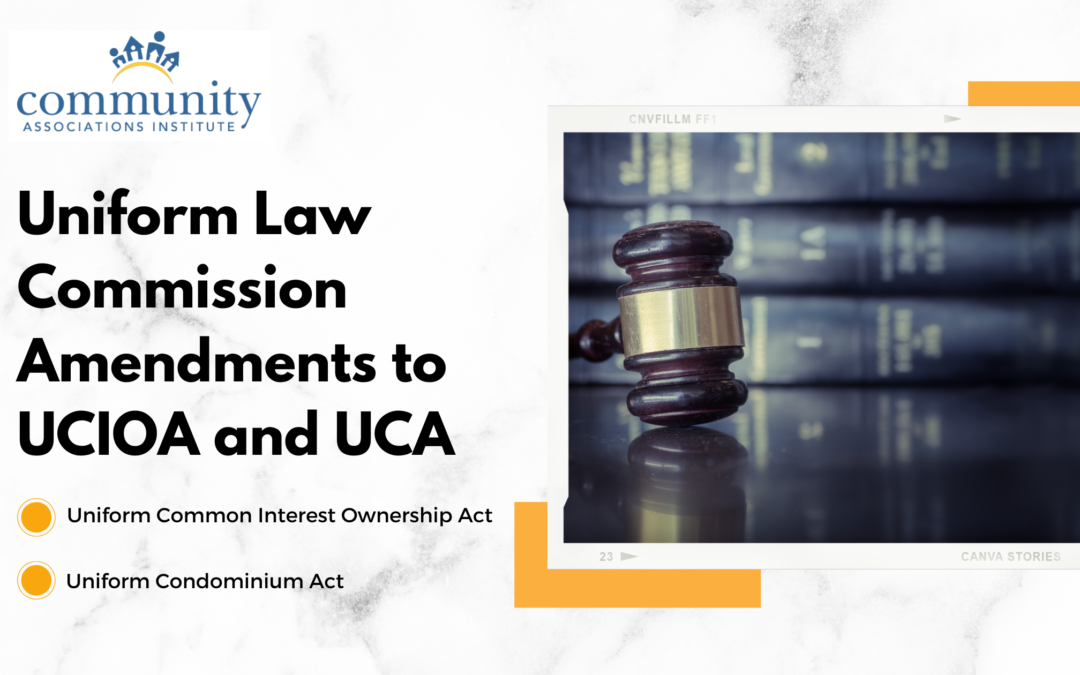By: J. David Ramsey
The Uniform Law Commission approved the work of a drafting committee that was charged with updating the Uniform Common Interest Ownership Act (UCIOA) and the Uniform Condominium Act (UCA) at its 2021 annual meeting in Madison, Wis. This resulted in some significant changes and is part of the evolution of these important laws.
Anyone wishing to see the amendments can view and download the document here. You will see the UCIOA version of the changes, which also will be incorporated in the UCA. Be aware, however, that while the changes were approved by the full Uniform Law Commission, it must still go through a final review by the style committee, whose members may make non-substantive changes to have all uniform laws follow certain style requirements.
Since the original condominium statutes in the U.S. were drafted in the 1960s, the commission has had more than 50 years of experience in the development and operation of common interest communities. According to the Foundation for Community Association Research, Community associations now represent between 22–24% of housing in the U.S., and this percentage continues to grow.
I served as CAI’s representative to the Joint Editorial Board on Uniform Real Property Acts and the drafting committee that oversaw these revisions.
While I encourage you to review all the changes to both laws, the following is a summary of what might be considered of greatest interest:
- §1-103 – Definitions
- (17A) – new definition for “Electronic.”
- (19) – New “master association” definition.
- §1-117 – Roadmap concerning which sections of UCIOA may be varied by the declaration or bylaws.
- §1-201 – Significant change to UCIOA’s (and UCA’s) applicability to new and existing associations. Provides that pre-UCIOA or UCA common interest communities are subject to most provisions of the law.
- §2-108 – Allows boards, subject to specific procedural requirements, to increase limited common elements (i.e. expansion of decks, patios, etc.)
- §2-112 – Allows boards to modify unit boundaries (including incorporating within a unit what was previously part of the common elements) subject to very specific conditions and requirements.
- §2-118 – Amendments to the termination of common interest community provisions, including partial termination provisions, and additional protections for owners who disagree with the value assigned to their unit as part of the termination process.
- §2-120 – Significant changes to provisions concerning master associations, including provisions providing for delegation and revocation of certain powers and duties of the section associations to the master association, such as provisions clarifying the liability of the section association following delegation of a power or duty to the master association.
- §2-125 – Prohibition on acquisition of title by adverse possession.
- §3-104 – Rewrite of nearly all of Section 3-104 dealing with the transfer of special declarant rights, including those provisions clarifying the liability of successor declarants for those improvements constructed by predecessor declarants.
- §3-108 – Amended to include provisions regarding remote owners’ meetings (i.e., Zoom and similar platforms).
- §3-109 – Amended to provide that if a quorum is met at the beginning of a meeting, the authority to hold the meeting continues notwithstanding owners leaving a meeting.
- §3-110 – Amended to include electronic voting at an owners’ meeting; provides clarifications on multiple owners of a single unit casting votes.
- §3-115 – Significant changes to individually assessing units for common expenses “uniquely benefitting less than all unit owners.”
- §3-125 – New section on a board’s emergency powers. Given the number and frequency of emergency governmental declarations dealing with fires, tornados, fires, etc., this section importantly authorizes certain board actions without owner approval.
CAI recommends the adoption of one or more of the uniform community association acts by all states. In those states where it is not appropriate, practical, or possible to adopt one or more of these uniform acts in their entirety, CAI supports and recommends consideration of appropriate portions of these laws.
Learn more about your state laws here.
David Ramsey is a shareholder of Becker in Morristown, N.J., a CAI past president, and a member of CAI’s New Jersey Legislative Action Committee.



